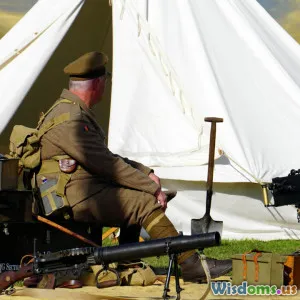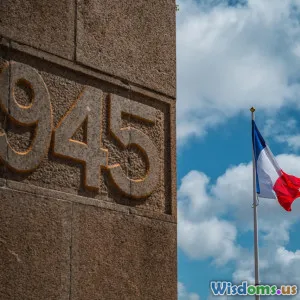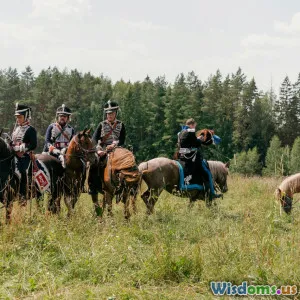
The Role of Secret Societies in Spreading Revolutionary Ideas
8 min read Explore how secret societies fueled revolutionary ideas, shaping history through clandestine influence and radical thought dissemination. (0 Reviews)
The Role of Secret Societies in Spreading Revolutionary Ideas
Introduction
Throughout history, the most transformative revolutions often begin quietly—far from the public eye and mainstream discourse. Secret societies, with their clandestine meetings and veiled memberships, have played a remarkable yet underappreciated role in shaping revolutionary ideas that change nations and the course of history. From fostering political dissent during oppressive regimes to incubating radical philosophical ideals, these shadowy groups have acted as catalysts for change.
Why do some of the world’s most revolutionary ideas germinate within secretive circles? How have these societies managed to spread notions of liberty, equality, and reform under the watchful eyes of authoritarian regimes? This article delves into the fascinating role of secret societies in disseminating revolutionary ideas, offering insights with examples and historical data to understand their enduring impact.
Origins and Characteristics of Secret Societies
Secret societies have existed for millennia, often arising in response to external control or suppression. Their defining traits include confidentiality, select membership, and use of symbology or coded language that fosters internal cohesion yet obscures their activities externally.
Early Examples
- The Carbonari: Emerging in early 19th-century Italy, this network aimed to unify Italy and overthrow foreign rule. Their extensive underground structure allowed them to spread nationalist and republican dogma.
- The Freemasons: Dating back to the late 16th and early 17th centuries, Freemasonry blended Enlightenment thinking with fraternal networks. While not revolutionary per se, Freemasons fostered critical societal discussions on liberty and governance.
Why Secrecy?
Secrecy serves as a shield against repression, enabling the transmission of controversial or dangerous ideas without immediate persecution. It also constructs an exclusive environment of trust and shared values that strengthen commitment and facilitate discreet communication.
Mechanisms of Spreading Revolutionary Ideas
Secret societies utilize various strategies to nurture and propagate transformative ideas effectively.
Education and Indoctrination
Many groups have been centers of intellectual activity, where members study radical philosophies and revolutionary political theories. For instance, the Illuminati, founded in 1776 in Bavaria, strategically cultivated Enlightenment ideals—liberty, secular governance, and equality—among influential young elites.
Symbolism and Ritual
Rituals and symbolism not only reinforce collective identity but also serve as vehicles conveying coded messages about ideals and goals, which members interpret and spread.
Networking and Influence
Members often held positions in government, military, or academic institutions. Through informal networking, secret societies influenced policy decisions and inspired broader movements. The Jacobins during the French Revolution evolved from salons and clandestine gatherings to become a powerful political force.
Use of Printed Media
Despite the secrecy, these societies frequently published pamphlets, newsletters, or manifestos under pseudonyms or anonymously, allowing dissemination beyond physical meetings. Lenin and Bolsheviks, though not a secret society strictly speaking, originally relied on underground publications to spread revolutionary Marxist ideas in Tsarist Russia.
Notable Secret Societies and Their Impact
The Freemasons and the American Revolution
Freemasonry permeated the social fabric of 18th-century America, counting founding fathers such as George Washington and Benjamin Franklin among its members. While freemasonry as an organization was not revolutionary, its emphasis on liberty, fraternity, and self-governance aligned closely with revolutionary ideals that helped ignite the American quest for independence.
The Carbonari and Italian Unification
The Carbonari leveraged secret networks across Italy to challenge Austrian dominance and the decentralized rule of the Papal States. Their success in spreading nationalist ideas contributed to the Risorgimento, ultimately culminating in Italy’s unification by the 1870s.
The Illuminati and the Age of Enlightenment
Though short-lived, the Bavarian Illuminati left a legacy through their advocacy of enlightened thinking and anti-clericalism. Their suppression paradoxically amplified surrounding intellectuals who embraced reason and scientific thought, planting ideological seeds for future revolutions.
The Revolutionary Cells and Modern Movements
Modern secretive groups such as the Revolutionary Cells in 20th-century Germany demonstrate the continued relevance of clandestine organizations. By staging covert protests and disseminating radical critiques of capitalist and imperialist systems, these groups pushed mainstream discourse towards social justice.
Challenges and Criticisms
Secret societies, while instrumental in spreading revolutionary ideas, face several criticisms:
- Exclusivity and Elitism: Their secretive nature can foster elitism, limiting the revolutionary potential to a select group.
- Conspiracy Theories: Mystique around secrecy often fuels conspiracy theories, undermining credibility.
- Risk of Fragmentation: Secrecy can lead to internal distrust and fragmentation, jeopardizing coherence.
Despite these challenges, historical evidence affirms their undeniable impact on transformative social and political changes.
Conclusion
Secret societies have been hidden architects of revolutionary change, fostering and propagating radical ideas that have shaped pivotal moments in history. Their veil of secrecy empowered intellectual freedom under oppressive regimes, created trusted networks of like-minded visionaries, and influenced key figures who steered revolutions.
Understanding their role offers not only a window into the past but insights into how even marginalized or suppressed voices can ignite profound societal shifts. As history advances, the dynamic between secrecy and revolution remains a fascinating testament to how ideas, no matter how covert, can ultimately illuminate and transform the world.
“The most certain test by which we judge whether a country is really free is the amount of security enjoyed by minorities.” — Lord Acton
This dictum underscores the delicate balance secret societies maintain in championing ideas that often originate from minority positions, yet ultimately reshape majorities.
References
- Mark, Clyde R., The Secret Societies: Their Influence and Power. New York: HarperCollins, 2010.
- Bert, Silvia, Freemasonry and Revolution: Ideas Beyond Conspiracy. Oxford University Press, 2017.
- Higham, Charles, Revolutions and Secret Orders. University Press, 2015.
- Wood, Gordon S., "The Radicalism of the American Revolution," Vintage Books, 1993.
Rate the Post
User Reviews
Popular Posts




















